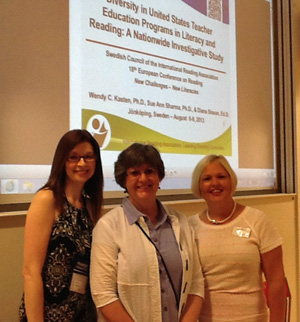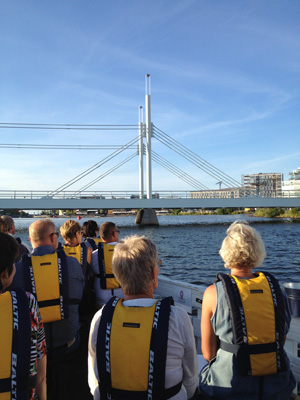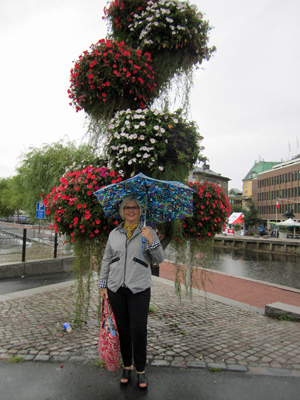I was thrilled to discover that the 18th European Reading Conference was going to be hosted by the Swedish Council of the International Reading Association (IRA) and held in Jonkoping, Sweden. Visiting Sweden and learning more about how the world reads were two items on my must do list. As an added bonus, members of IRA’s Diversity Learning Committee, Wendy C. Kasten, Diana Sisson and I, presented on “Diversity in United States Teacher Education Programs in Literacy and Reading: A Nationwide Investigative Study” (Kasten, Sharma & Sisson, 2013).
 Sisson, Kasten, and Sharma
Sisson, Kasten, and Sharma
 Boat Tour
Boat Tour  Sue Ann Sharma
Sue Ann Sharma In between fulfilling these aspirations, the conference itinerary included superb keynotes, new report findings, and rich conversations. Here are some impressions for anyone considering participating in an IRA affiliated conference in a distant country.
Exploring Jönköping
Jönköping is Sweden’s 9th most populated city. It is known for it matchstick industry 1845-1970 and home to ABBA’s group member, Agnetha Faltskog. When arriving via a three-hour train ride from Stockholm, the city can be spotted nestled against Lake Vättern, Sweden’s 2nd largest lake. The Sommarstället Munksjön’s boat ride is a must. Waiting to be explored are the many different shops from antique to hip. Taste an array of ethnic cuisine among the city’s 85 restaurants. The cuisine is indicative of the diversity in this university town, which has attracted 1500 students from over 65 countries. The food and people of Jönköping will capture your heart.
How the World Reads: New Challenges, New Literacies, Global Context
Mirroring the international students that attend Jönköping University, teachers and teacher educators from around the world gathered together to learn and have grand conversations about contextual issues related to 21st Century literacy practices. My fingers couldn’t keep up as I tried to capture every word of the variety of literacy aspects being addressed during the plenary sessions. Here’s a glimpse at both European and American context.
European Context
Insights gleaned from Digital Futures: Learning and Teaching Literacy in the Digital Age affirmed for me that teachers worldwide are meeting the challenges of new media literacies in many different ways. During this lecture, Jackie Marsh, from the University of Sheffield, United Kingdom, shared some unique ways in which children use virtual worlds. Examples included children selecting a bedtime story from QR codes on pajamas and the blurring of online/offline classroom investigations in which children retrieve information from QR codes placed on trees.
American Context
While sharing results from several online research projects, Donald Leu, from University of Connecticut, United States, helped us contextualize the social practices of literacy in a digital age using the dual level theory of new literacies (Leu, Kinzer, Coiro, Castel, & Henry, 2013). The dual level theory of new literacies focuses on trends and patterns emerging from “Upper Case New Literacies,” based on common findings from localized and domain-specific “lower case new literacies” such as social interactions occurring with text messaging. The Digital Futures in Teacher Education Project and Online Research and Comprehension Assessment (ORAC) projects promote new insights in both theory and practices that prepare teachers and students for the future.
Creating Opportunities for International Collaboration
Literacy topics across nine strands framed the parallel sessions and verified for me common literacy challenges being addressed worldwide including “The Third Progress in International Literacy Study (PIRLS)” report which revealed information on international trends in reading achievement in fourth graders from 49 countries. In response to the adolescent reading difficulties made evident by the PISA studies, an international team formed to address the lack of reading instruction across the curriculum. This collaboration resulted in the European Comenius Project: “BaCuLIt” – Basic Curriculum for Teachers’ In-Service Training in Content Area Literacy in Secondary Schools.
International Teacher Educator Exchange
As Americans, we know our classrooms are becoming increasingly more diverse. However, I can now testify from the discussion with teacher educators from around the world, that this is the case worldwide. Ultimately, this conference heightened my curiosity about addressing the complexities teachers face when meeting the diverse needs of learners globally.
Final Thoughts
I loved the learning that took place during breaks and lunch. These informal interludes held their own charm. They provided time for thoughtful dialogue concerning teacher educational programs around the world while sipping tea with colleagues from countries such as Australia, Turkey, and Russia.
The European Reading Conference was an incredible experience. I discovered many admirable literacy practices. Mark your calendar for the 19th European Reading Conference. In 2015 this biennial will be held in Klagenfurt, Austria.
References
Leu, D. J. (2013, August). New literacies of online research and comprehension: Reading with a lens to the future as well as a lens to the past. Paper presented at the 18th European Reading Conference. Jönköping, Sweden. Retrieved from. http://www.slideshare.net/djleu/18th-european-conference-on-reading-scira-25083475.
Leu, D. J. (2013, August). Online reading comprehension assessment. Paper presented at the 18th European Reading Conference. Jönköping, Sweden. Retrieved from. http://www.orca.uconn.edu/
Marsh, J. (2013, August). Digital futures: learning and teaching literacy in a digital age. Paper presented at the 18th European Reading Conference. Jönköping, Sweden. Retrieved from. Retrieved from http://www.slideshare.net/ed1jam/ecor-marsh
Marsh, J. (2013, August). Digital futures in teacher education. Paper presented at the 18th European Reading Conference. Jönköping, Sweden. Retrieved from http://www.digitalfutures.org/.
Institute for German Language and Literature II, University of Cologne, Germany (2013). BaCuLit. Retrieved from http://www.alinet.eu/index.php?option=com_content&view=article&id=53&Itemid=50
International Development in European Committee of the International Reading Association (2013). 19th European Reading Conference. Retrieved from http://www.literacyeurope.org/meetings-conferences/european-conferences/
International Association for the Evaluation of Educational Achievement (IEA), Progress in International Reading Literacy Study (PIRLS), 2011. Retrieved from http://nces.ed.gov/surveys/pirls/pirls2011.asp
Kasten, W. C., Sharma, S. A., Sisson, D. (2013, August). Diversity in United States teacher education programs in literacy and reading: A nationwide investigative study. Paper presented at the 18th European Reading Conference. Jönköping, Sweden.
Leu, D. J., Kinzer, C.K., Coiro, J., Castek, J., Henry, L.A. (2013). New literacies: A dual level theory of the changing nature of literacy, instruction, and assessment. In N. Unrau & D. Alvermann (Ed.s), Theoretical models and processes of reading (6th ed., pp. 1150-1181). Newark, DE: International Reading Association.
 Sue Ann Sharma is a visiting assistant professor at Oakland University in Michigan, dr.sueann@gmail.com.
Sue Ann Sharma is a visiting assistant professor at Oakland University in Michigan, dr.sueann@gmail.com.
This article is an addendum to an article from the October/November 2013 issue
of Reading Today. IRA members can read the interactive digital version of the magazine here. Nonmembers: join today!